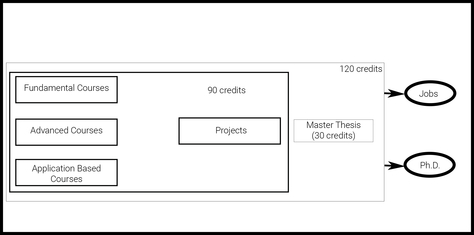Choosing Your Courses
We expect you to have an area of interest, specific enough for you to opt for a masters course in data science but broad just enough to explore and finish the required credits here at OvGU. Any text that follows next, assumes that you have an area of interest.
But it is perfectly all right if you do not have any yet, we would encourage you to explore more and figure out at the earliest, things that interest you.
Let's take the help of this image here. The outer rectangle here depicts your area of interest, followed by the rectangle next which represents your Masters course. The oval shaped bubbles shows your possible options after your Masters course.
In theory, the masters course is two years long. Thus, the university recommends you to take 30 credits every semester, provided you have the prerequisite knowledge and skill set for each individual course.
You need to complete 90 credits to be eligible for the 30-credit worth master thesis.
We encourage you to explore the fundamental courses prior to taking the advanced courses, application based courses, and projects.

- Project Requirements
For DKE students - Must complete at least one 6-credit team project as part of the 90-credit curriculum to qualify for the master's thesis.
For DE students - Required to complete two projects: ITP (6 CP) & DE-P (12 CP), which can be split into two 6-credit projects.
- Course Structure & Selection
To complete your 90-credit requirement, you must enroll in and pass courses organized under specific modules. The complete structure is outlined in the Study and Examination Regulations.
Module Handbook - Lists all available FIN faculty courses.It Includes details such as language of instruction (German: "Sprache"), prerequisites, and eligibility for M.Sc. DKE/DE students.The latest version is accessible via the faculty homepage.It is in German and is legally binding.The mapping to topic areas is found in the module lists, which should be consistent with the module handbook.
LSF(student portal) - Displays semester specific course offerings. Course availability differs between summer and winter semesters.
- Planning and Preparation
At the start of each semester, an "Introduction to DE/DKE" session is held, explaining the program structure. Presentation slides from past sessions are available on the faculty homepage. In case of confusion, please consult a mentor through email (email guidelines).
Course planning tips - Shortlist courses for future semesters, but stay flexible as offerings may change.You can see the details of the courses offered by going to their individual web pages.Track your credits per semester to manage your workload effectively. In case you need some more information about the courses, do check out the set of course preparatory videos made by SI @ FIN. If the existing literature does not help, please feel free to consult a mentor, or the faculty member directly. In case you have taken a course and are facing issues, contact the faculty. Here too, the preferred mode of communication is a written email.
Recommended Course for Scientific Writing - If you're new to scientific writing and scientific work, consider taking the 6-credit course: Principles and Practices of Scientific Work (by Dr. Krull & Madhura Thosar).
- Career & Future Opportunities
What's next after your Master's?
- PhD Aspirations? Speak with professors about research opportunities.
- Looking for a job? Stay connected with the Career Center.
- Interested in startups? Explore TUGZ & the International Startup School
Additionally you will find all the study docs compiled here.
We hope this article helped. Email a mentor if you need any help.




